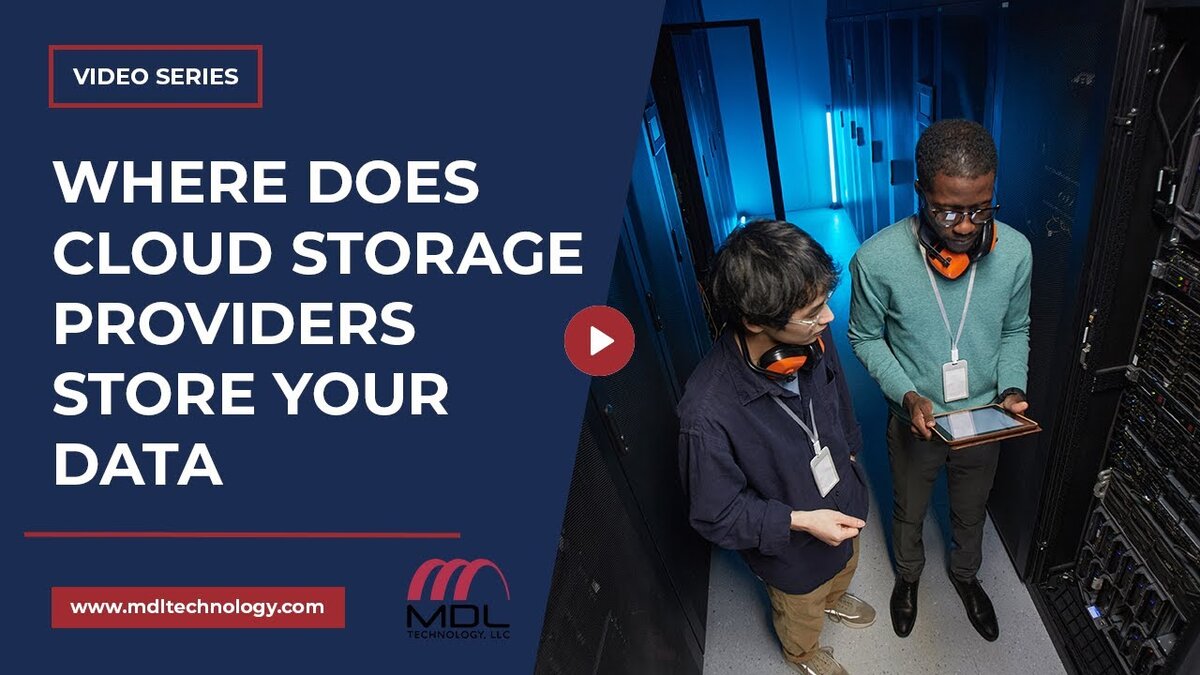
Have you ever wondered if there’s a missing piece in your business puzzle? Or, have you perhaps wished for something that can take your operations to the next level and give you a competitive edge? If so, it’s time to consider the transformative power of cloud computing services. Explore cloud computing services, their importance for businesses, and how they can be the key to unlocking your business’s potential.
Cloud Computing Services Defined
Simply put, cloud computing services involve accessing and utilizing computing resources, such as storage, servers and software, over the internet. Instead of relying on local infrastructure, businesses can tap into the power of remote servers and services provided by cloud service providers.
Three main cloud computing service models exist:
Infrastructure as a Service (IaaS)
Infrastructure as a Service (IaaS) is a cloud computing service model that provides businesses with virtualized computing resources. IaaS provides access to servers, storage and networks hosted and maintained by a cloud service provider, eliminating the need for companies to invest in and manage their own physical infrastructure.
The key advantage of IaaS is its flexibility and scalability. Businesses can scale resources up or down based on current needs. For example, if your business experiences a sudden increase in website traffic, you can quickly allocate additional server resources to handle the higher demand. Conversely, during periods of lower activity, you can scale down your resources to avoid unnecessary costs. This flexibility allows you to align your infrastructure expenses with your actual usage, resulting in cost savings.
Moreover, IaaS reduces upfront infrastructure costs. Instead of purchasing and maintaining physical servers and networking equipment, businesses can rely on the infrastructure provided by the IaaS provider. Investing in expensive hardware or worrying about its maintenance, upgrades or replacements is nonexistent with IaaS. The IaaS provider handles all the infrastructure-related tasks, allowing you to focus on your core business activities.
Examples of popular IaaS providers include Amazon Web Services (AWS), Microsoft Azure and Google Cloud Platform. These providers offer various infrastructure services, such as virtual machines, storage solutions, load balancers and networking capabilities. They have a global presence, ensuring high availability and reliability for business operations.
The benefits of leveraging IaaS go beyond cost savings and flexibility. By utilizing virtualized infrastructure, businesses can also reduce the time and effort required for maintenance tasks. The IaaS provider takes care of hardware updates, security patches and system upgrades, allowing you to focus on driving innovation and improving your business. This reduced maintenance burden enables a more effective and productive allocation of IT resources.
Platform as a Service (PaaS)
Platform as a Service (PaaS) is a cloud computing service model that provides a platform for developing, testing and deploying applications without the need to manage the underlying infrastructure. PaaS simplifies the development process by offering a complete development environment, including runtime settings, libraries and tools.
With PaaS, developers can focus on writing code and building applications without worrying about setting up and managing servers, storage and networking components. This eliminates the need for businesses to invest in hardware and infrastructure maintenance, allowing them to streamline the development process and reduce time to market.
One of the primary advantages of PaaS is increased productivity. Developers can leverage pre-configured development environments, ready-to-use components and built-in services offered by the PaaS provider. These services may include databases, messaging systems, authentication and more. By utilizing these pre-built components, developers can save time and effort, accelerating the application development cycle.
PaaS also enables faster application deployment. The platform takes care of the underlying infrastructure provisioning and management, allowing developers to focus solely on deploying their applications. With PaaS, you can easily deploy your applications to multiple environments, such as development, testing and production, with just a few clicks. This streamlined deployment process ensures faster time to market, giving your business a competitive edge.
Examples of well-known PaaS providers include Heroku, Microsoft Azure App Service and Google App Engine. These platforms offer a range of development tools, services and runtime environments to support different programming languages and frameworks. They provide scalability and flexibility, allowing applications to handle varying levels of traffic and easily accommodate growth.
Scalability is another advantage of PaaS. As your application usage grows, the platform automatically scales up the required resources to handle the increased demand, eliminating the need for manual capacity planning and infrastructure scaling. With PaaS, you can seamlessly handle spikes in traffic or user activity without disruptions, ensuring a smooth user experience.

Software as a Service (SaaS)
Software as a Service (SaaS) is a cloud computing service model that delivers ready-to-use software applications over the internet. With SaaS, users can access and utilize software applications without the need for installation, setup or maintenance on their local devices.
One of the main advantages of SaaS is easy accessibility. Users can access SaaS applications through a web browser or dedicated client software, regardless of their operating system or device, eliminating compatibility issues and providing seamless access to the software from anywhere with an internet connection. Users can collaborate, communicate and work on projects in real time, enabling remote work and enhancing productivity.
SaaS eliminates the need for upfront software installation and reduces maintenance burden. Users don’t have to worry about purchasing and installing software on their laptop, desktop, tablet or other device. The software is hosted and maintained by the SaaS provider, who is responsible for updates, security patches and infrastructure management. This type of cloud computing service relieves businesses from the hassle of software maintenance, allowing them to focus on utilizing the software and achieving their business goals.
Popular examples of SaaS applications include Salesforce (customer relationship management), Slack (team communication and collaboration) and Dropbox (file storage and sharing). These applications provide a range of features and functionalities readily available to users with a subscription or usage-based pricing model. Users can access the latest version of the software without any manual updates or compatibility concerns.
Automatic updates are another benefit of SaaS. The SaaS provider handles software updates and upgrades behind the scenes, ensuring that users always use the latest version of the software, including new features, bug fixes and security enhancements. Automatic updates save time and effort for users, as they don’t have to download and install updates or worry about compatibility issues manually.
From a cost perspective, SaaS offers a cost-effective approach to software usage. Instead of purchasing individual software licenses or investing in expensive infrastructure, businesses can subscribe to SaaS applications on a pay-as-you-go basis, eliminating the need for significant upfront investments and allowing businesses to scale their software usage based on their needs. SaaS also reduces costs associated with software maintenance, as it is typically included in the subscription fee.
What to Look for in a Cloud Computing Service Provider
Choosing the right cloud computing service provider is essential for maximizing the benefits of cloud services. According to the International Data Corporation’s Worldwide Semiannual Public Cloud Services Tracker, the worldwide revenue for the public cloud services market reached $545.8 billion in 2022, with Software as a Service (SaaS – Applications) being the largest revenue source accounting for over 45% of the total. Furthermore, the Google Cloud Brand Survey of 2022 found that 41.4% of leaders in the technology and business sectors intend to boost their expenditure on cloud-based services and products because of existing economic conditions. This significant growth and dominance of SaaS applications indicate the increasing adoption of cloud-based software solutions by businesses, highlighting the importance of leveraging SaaS applications for improved efficiency, scalability and cost-effectiveness.
With the understanding of the significant growth and dominance of SaaS applications in the public cloud services market, it’s crucial to consider several critical factors when selecting a provider to ensure optimal utilization of these cloud-based software solutions.
Reliability and Performance
According to a technical director in the Office of the CTO at Google Cloud, Paul Strong, “Companies live or die, succeed or fail by their use of technology.” So, a reliable and high-performance cloud computing service provider is crucial for seamless operations. Look for providers that offer:
- Strong service uptime and availability, guaranteeing to ensure your applications and services are accessible when needed.
- High-performance infrastructure with fast and reliable network connectivity to support smooth data transfer and user experience.
- Redundancy and disaster recovery capabilities to minimize downtime and ensure business continuity.
Security and Compliance
Data security is a top priority when it comes to cloud computing. Consider providers that prioritize:
- Robust data encryption and secure access controls to safeguard your sensitive information.
- Compliance with industry-specific regulations and standards, such as HIPAA for healthcare or GDPR for data protection.
- Regular security audits and certifications to ensure the provider maintains a secure environment for your data.

Scalability and Flexibility
Your chosen provider should offer scalability and flexibility to meet your evolving business needs. Look for:
- The ability to easily scale resources up or down based on demand to optimize costs and accommodate growth.
- Support for your business’s future expansion plans, whether it’s expanding into new markets or launching additional products/services.
- Flexible pricing models that align with your usage patterns and enable cost-effective resource allocation.
Support and Service Level Agreements (SLAs)
Reliable customer support and well-defined Service Level Agreements (SLAs) are crucial for a positive cloud experience. Consider providers that offer:
- Responsive customer support and technical assistance to address any issues or concerns promptly.
- Clear SLAs that define uptime guarantees, response times for support requests and resolution times for any service disruptions.
- 24/7 monitoring and proactive maintenance to ensure optimal performance and minimize downtime.
Data Governance and Ownership
Understanding data governance and ownership policies is essential to protect your data assets. Look for providers that offer:
- Clear data ownership and control policies, ensuring that you retain ownership of your data and have control over its usage.
- Data portability options and seamless migration capabilities allow you to easily move your data between different cloud providers or back to your on-premises infrastructure.
- Regular data backups and reliable disaster recovery procedures to ensure data integrity and availability.
Integration and Interoperability
Compatibility and integration capabilities are important for smooth operations across your IT ecosystem. Consider providers that offer:
- Compatibility with your existing systems and applications, enabling seamless integration without significant reengineering efforts.
- Support for APIs (Application Programming Interfaces) to facilitate easy integration with third-party services and streamline workflows.
- Interoperability across multiple cloud platforms, if required, to ensure flexibility and avoid vendor lock-in.
Cost and Value
Understanding the cost structure and value-added services is essential for effective budgeting and cost optimization. Consider providers that offer:
- Transparent pricing structure and billing practices, ensuring you have a clear understanding of the costs involved.
- Cost optimization features, such as resource optimization recommendations or usage tracking tools to help you optimize your cloud spend.
- Value-added services and features that align with your business requirements, such as advanced analytics, AI capabilities or specialized industry solutions.
Reputation and Experience
A provider’s reputation and experience can provide insights into their ability to deliver quality services. Consider providers with:
- Established track records and positive customer reviews, indicating their reliability and customer satisfaction.
- Experience in serving businesses in your industry or with similar requirements, demonstrating their understanding of your specific needs.
- Proven expertise in implementing and managing cloud solutions, ensuring a smooth transition and effective utilization of cloud services.
By carefully evaluating these factors and considering your specific business requirements, you can choose a cloud computing service provider that best aligns with your goals. This choice will pave the way for successful cloud adoption and enable you to leverage the full potential of cloud services for your business.
MDL Technology as a Proven Service Provider
MDL Technology is a trusted cloud computing service provider offering customized solutions to meet the unique needs of businesses. With our industry-specific expertise, we understand the challenges and compliance requirements that different sectors face. Rest assured that we will implement robust security measures to safeguard your data, including data encryption, secure access controls and strict adherence to industry regulations such as HIPAA and GDPR. Our dedicated support team is always here to provide proactive monitoring and promptly address any issues, ensuring high availability and optimal performance.
We specialize in seamless migration and integration services, making your transition to the cloud a smooth and hassle-free experience. Our team has extensive experience migrating applications, data and infrastructure to various cloud platforms. We understand the importance of integrating your cloud solutions with existing systems, enabling streamlined workflows and seamless data flow.
By partnering with MDL Technology, you can focus on the core activities of your business while entrusting the complexities of managing cloud infrastructure to our experts. Our customized solutions, industry-specific knowledge, robust security measures, dedicated support and seamless migration and integration services empower businesses like yours to optimize their cloud environment, enhance security and drive innovation in the digital era.






